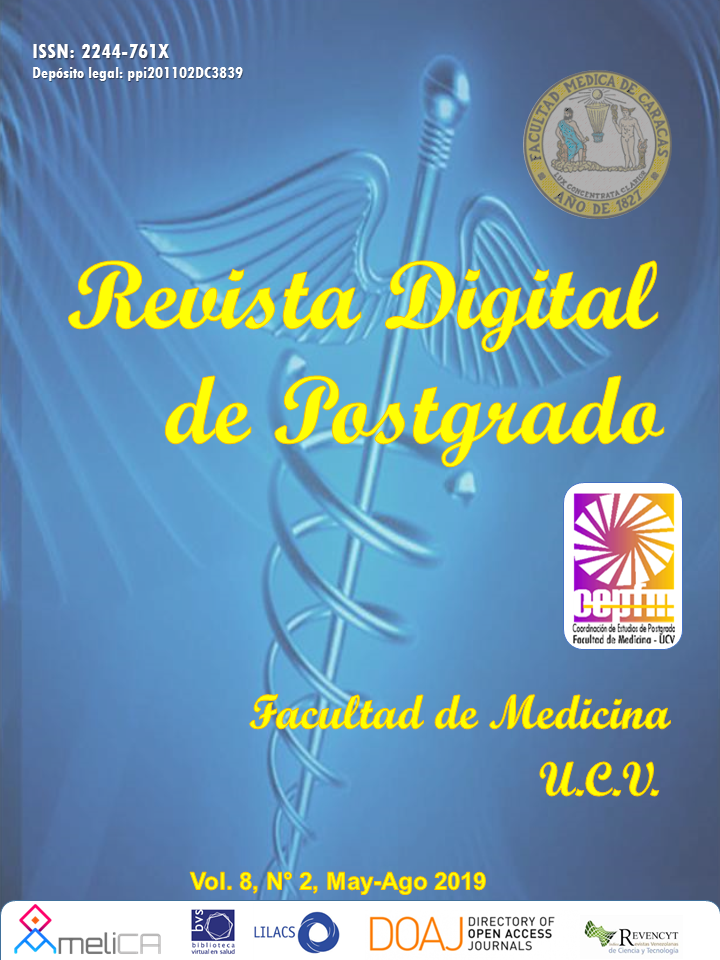Systemic lupus erythematosus: educational impact on the quality life of patients
Keywords:
Lupus, Education, Quality of life, illnessAbstract
Objective: To analyze the impact of an educational program in patients with systemic lupus erythematosus and its effect on the quality of life attached to the unit rheumatology Dr. Miguel Perez Carreño Hospital during 2016. Methods: An experimental study where two groups were compared: 1 group which was intervened educationally about Lupus and 1 group which was intervened educationally about other health-related issues. All patients were chosen from the unit of rheumatology at the Hospital Dr Miguel Perez Carreño. Results: 50 patients were included in the study, 25 in each group. It was demonstrated in both groups no knowledge about their condition (points mean: experimental: 9.4 vs control: 11.1). The quality of life related to health in both groups both physical and mental was not favorable pre educational intervention. Adherence to treatment improved after the educational intervention (p <0.05). Conclusion: The results of the research indicate that the impact of the educational program was favorable by significantly improving the knowledge of the disease, the quality of physical and mental life, achieving a better adherence to the indicated treatment and decreasing in turn the level of activity of the LES.Downloads
References
Figueiredo-Braga M, Cornaby C, Cortez A, Bernardes M, Terroso G, Figueiredo M, et al. Depression and anxiety in systemic lupus erythematosus: The crosstalk between immunological, clinical, and psychosocial factors. Medicine. 2018; 97(28):e11376.
Molina J, Alarcón S, Molina J. Fundamentos de medicina. Reumatología. 6a ed. Medellín-Colombia: CIB; 2007.
Ariza K, Isaza P, Gaviria A, Quiceno J, Vinaccia S, Alvarán L. Calidad de vida relacionada con la salud, factores psicológicos y fisiopatológicos en pacientes con diagnóstico de Lupus Eritematoso Sistémico – LES, Ter Psicológica. 2010; 28(1):27-36.
Karlson E, Matthew L, Eaton H, Huang J, Fitzgerald L, Rogers M, et al. A Randomized Clinical Trial of a Psychoeducational Intervention to Improve Outcomes in Systemic Lupus Erythematosus. Arth & rheumatism. 2004; 50(6):1832–1841.
Haupt M, Millen H, Janner M, Falagan D, Fischer-Betz R, Schneider M. Improvement of coping abilities in patients with systemic lupus erythematosus: a prospective study. Ann Rheum Dis. 2005; 64:1618–1623.
Zheng Y, Ye DQ, Pan HF, Li WX, Li LH, Li J, et al. Influence of social support on health-related quality of life in patients with systemic lupus erythematosus. Clinical Rheumatology. 2009; 28:265-269.
Hale ED, Treharne GJ, Lyons AC, Norton Y, Mole S, Milton DL. ‘‘Joining the dots’’ for patients with systemic lupus erythematosus: personal perspectives of health care from a qualitative study. Ann Rheum Diss. 2006; 65:585-589.
Furukawa M, Kiyohara C, Horiuchi T, Tsukamoto H, Mitoma H, Kimoto Y, et al. Quality of life in Japanese female patients with systemic lupus erythematosus: evaluation using the short form 36 health survey. Mod rheumatology. 2015; 26: 240-247.
Del Pino-Sedeño, Trujillo M, Ruiz I, Cuellar P, De Pascual M, Serrano A, et al. Effectiveness of nonpharmacologic interventions for decreasing fatigue in adults with systemic lupus erythematosus: A systematic Review. Arthritis Care. 2016; 68: 141-148.
Molina JF, Anaya JM, Molina J. Lupus Eritematoso: Manual práctico para médicos y pacientes. 2a ed. Medellín, Col: CIB; 2005.
World Health Organization Quality of Life Group. Study protocol for the World Health Organization project to develop a quality of life assessment instrument (WHOQOL). Qual Life Res. 1993; 2: 153-159.
Hill J, Bird H, Johnson S. Effect of patient education on adherence to drug treatment for rheumatoid arthritis: A randomized controlled trial. Annals of the Rheumatic Disease. 2001; 60: 869-875.
Bimbela JL. Cuidando al cuidador: counseling para profesionales de la salud. 4a ed. Granada: Escuela Andaluza de Salud Pública; 2001.
Cerda JC. Pacientes empoderados para una mayor confianza en el sistema sanitario. España: Elservier; 2015.
Bodenheimer T, Lorig K, Holman H, Grumbach K. Patientself-management of chronic disease in primary care. JAMA. 2002; 288:2469-2475.
López F, Obrador G. Manual de medicina basada en la evidencia. México: Manual moderno; 2001.
Whalley D, McKenna SP, De Jong Z, van der Heijde D. Quality of life in Rheumatoid Arthritis. British Journal of Rheumatology. 1997; 36: 884-888.
Toro R, Yepes L. Fundamentos de Medicina. Psiquiatría. 5a ed. México: Corporación para investigaciones Biológicas; 2004.
Jadad A, Cabrera A, Lyons RF, Martos F, Smith R. When people live with multiple chronic diseases: A collaborative approach to an emerging global challenge. EASP. 2010; 5:117-138.
Taal E, Rasker JJ, Wiegman O. Patient education and self-management in the rheumatic diseases: A self – eficacy approach. Arthritis Care and Research. 1996; 9:229-238.
Gonzalez N. Simposio de calidad de vida. Archivos de Reumatologia. 1993; 4(1): 40-42.
Basra M, Fenech R, Gatt R, Salek M, Finlay A. Dermatology Life Quality Index 1994-2007: a comprehensive review of validation data and clinical results. Br J Dermatol. 2008; 159: 997-1035.
How to Cite
Issue
Section
License
Usted es libre de:
- Compartir — copiar y redistribuir el material en cualquier medio o formato
- Adaptar — remezclar, transformar y construir a partir del material
- para cualquier propósito, incluso comercialmente.
Bajo los siguientes términos:
-
Atribución — Usted debe dar crédito de manera adecuada, brindar un enlace a la licencia, e indicar si se han realizado cambios. Puede hacerlo en cualquier forma razonable, pero no de forma tal que sugiera que usted o su uso tienen el apoyo de la licenciante.
- No hay restricciones adicionales — No puede aplicar términos legales ni medidas tecnológicas que restrinjan legalmente a otras a hacer cualquier uso permitido por la licencia.











